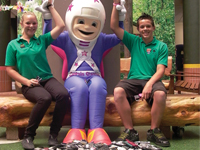

<p><img class=" alignright size-full wp-image-155" style="margin: 5px; float: right;" src="http://schoolnewsnz.fastrackdev.com/wp-content/uploads/2011/10/fundraising.jpg" alt="fundraising" width="200" height="150" />It has become an accepted part of the schooling system in New Zealand. ;</p>
<p> <!--more--> </p>
<p>Fundraising is the only way that most schools can offer their students the facilities and accessories that are now taken for granted.</p>
<p>In part, it is driven by the perceived necessity for pupils to own a portable computer, but the demands on schools and parents are often far more prosaic. In the year to August 2010, cash-strapped parents had to apply for more than $6.3 million in advance benefits to pay for their children&#8217;s school uniforms, stationery and fees.</p>
<p>Most principals and boards of governors will have wracked their brains about the best way of achieving a successful fundraising result. For their school to carry it out themselves they need to call on the good graces of staff and persuade busy parents to play their part, too. Much of the success or failure will depend on whether there is at least one human dynamo with the requisite leadership skills among either the staff or parents.</p>
<p>But fundraising can also be a lot of fun for pupils, staff, parents and even the local community. Coming up with the right idea to harness children&#8217;s boundless enthusiasm and energy will usually reap big dividends, particularly when adapted to local conditions.</p>
<p>One example was the Great Grape Stomp in Queenstown held by the Remarkables Parent Association (RPA) this year in conjunction with the Remarkables Primary School and the Amisfield Wine Company, which donated the grapes. Their creation was the aptly named Squish Squash Squelch wine label. According to the RPA chairperson, the noise and energy created during the grape stomping was &#8220;staggering&#8221;.</p>
<p>A magic ingredient can be a worthwhile community project when combined with school fundraising.</p>
<p>A major success here has been the participation of more than 600 schools across the country in the Starship School Phone swap, a programme designed to help both the National Children&#8217;s Hospital, as well as the schools involved, to get valuable resources for their classrooms. The idea was for the children to collect as many old mobile phones as they could to raise funds for Starship&#8217;s Air Ambulance Service, which airlifts hundreds of children with life-threatening medical conditions to the hospital every year.</p>
<p>But if schools decide to look for outside help, they will find no shortage of professional organisations willing to assist with advice, ideas or products.</p>
<p><strong>Considerable care needed</strong></p>
<p>As with any project concerning money, a great deal of care should always be taken. One safeguard when working with outside organisations is to make sure they are members of the Fundraising Institute of New Zealand (FINZ).</p>
<p>FINZ is the professional body for fundraisers and organisations involved with charities and not-for-profits in New Zealand. It works with more than 200 such organisations on local, national and global issues.</p>
<p>FINZ provides professional development training, a quarterly magazine, monthly e-newsletter, members&#8217; area and discussion groups on the FINZ website. FINZ has an annual conference, mentoring, library services and advocacy along with other services to members.</p>
<p>And however a school decides to raise funds, there are strict rules set out by the Ministry of Education that must be adhered to. A report from the Office of the Controller and Auditor-General, released in 2005, highlighted a number of inadvertent breaches of law among integrated schools, which had occurred in previous years.</p>
<p>&#8220;These findings raised some concerns about the financial relationships that exist between some proprietors and boards of trustees of integrated schools who are strongly advised to consult the Ministry&#8217;s guideline,&#8221; the report said.</p>
<p><strong>Go with the flow</strong></p>
<p>One of the generally agreed principles when fundraising is to tap into current societal trends rather than trying to go against them. For instance, while children and people in general are being given a strong healthy-eating message there could well be resistance to featuring foods that could be considered fatty. On the other hand, promotions such as sponsored walks and fun runs may well tap into the recent emphasis on maintaining health through activity.</p>
<p>Whatever idea a school chooses to focus on will depend on its own particular circumstances and the range of skills it can call on. What suits one will not necessarily suit another.</p>
<p>For schools that decide to go it alone, the PPTA offers a vast range of helpful ideas, from the old stalwarts of raffles and cake stalls to swim nights and international food festivals. PPTA also welcomes any new suggestions. Everyone is looking for that elusive piece of magic to make fundraising a success.</p>

EXCLUSIVE: Teachers used to be paid two to three times more than minimum wage workers,…
After an “overwhelming” vote to reject the latest Government offer, secondary school teachers will begin…
Second-language learning should be compulsory, says a new report from a forum bringing together academics,…
A new entitlement aimed to improve access to learning support coordinators for schools with students…
Educators have raised questions about the Ministry of Education’s new secondary school subjects, set to…
Professional learning and development (PLD) for teachers needs to be higher impact for teachers and…
This website uses cookies.